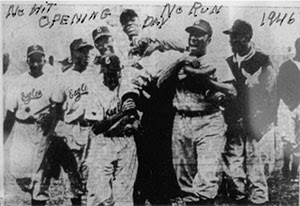 Whenever I am asked to write or speak about my father, or the men of the Negro League, or the Negro League in general, I always have to ponder the question: What would he say? What would THEY say? That’s the first thing I think about. What would he say? I do this because there is a certain amount of responsibility that comes with telling someone else’s story. Even though I am a part of my father’s story it is his story. It always reminds of the tragedy of our myopic portrayal of history. The old adage that “History is always told from the perspective of the “winners””. When the fullness of our social evolutionary experience is not told through the voices of the many, and when we lose undocumented primary sources of our history, we lose our ability to be informed by the lessons of our past. We remain trapped in this endless cycle of half-truths, a breeding ground for bias, intolerance and self-righteousness.
Whenever I am asked to write or speak about my father, or the men of the Negro League, or the Negro League in general, I always have to ponder the question: What would he say? What would THEY say? That’s the first thing I think about. What would he say? I do this because there is a certain amount of responsibility that comes with telling someone else’s story. Even though I am a part of my father’s story it is his story. It always reminds of the tragedy of our myopic portrayal of history. The old adage that “History is always told from the perspective of the “winners””. When the fullness of our social evolutionary experience is not told through the voices of the many, and when we lose undocumented primary sources of our history, we lose our ability to be informed by the lessons of our past. We remain trapped in this endless cycle of half-truths, a breeding ground for bias, intolerance and self-righteousness. I think he would say the story of the Negro League is a story of Black people in America, and their struggle not only to survive but to thrive.
He would no-doubt speak about the joy of the game and the fellowship of like travelers. He would talk about the brotherhood stronger than could be expressed using words like “team” or “team mates”. You would know and understand the strength of their connection as he described their relationships. He would smile at the remembrance. He would find excitement, as he leaned forward to tell anecdotal stories that he wanted to make sure you heard. He would laugh, and the joy of the experience would be reflected in the vibrations of his body. He would lean back and take a draw on his cigarette and then move on to the next story. He, like all the other men who played in the league, were marvelous story tellers.
But they told very few about what it took to move through the streets of America at a time when violence and terror were open strategies used to maintain the “racial” hierarchy. This was a time when Black men would go to war and come home to live through another. It was a time when the economic and legal systems created other mechanisms (red lining, disparate banking practices etc.) that ensured that returning GIs would soon understand that the GI bill didn’t include them. So Black communities did what they have always done. They created their own reality parallel to the country that turned its back on them.
But they told very few about what it took to move through the streets of America at a time when violence and terror were open strategies used to maintain the “racial” hierarchy. This was a time when Black men would go to war and come home to live through another. It was a time when the economic and legal systems created other mechanisms (red lining, disparate banking practices etc.) that ensured that returning GIs would soon understand that the GI bill didn’t include them. So Black communities did what they have always done. They created their own reality parallel to the country that turned its back on them.
I cannot imagine all that it took to continue to dream into anything beyond what existed, but they did—and generations learned it is possible. Pioneers like Rube Foster were models for anyone wanting to create something out of nothing.
Little Black boys learned that they could not be denied the right to exercise their talent and skill at thehighest level of play. And, like their white counterparts in the “Major” Leagues, they could make a living doing it. Though their compensation was less, their play was magical and inspiring.
The robust level of play they exhibited evolved from an existing community coloring their language with “trash talking”, being “called out”, and the “opportunities to improve” that looked and felt more like a challenge or dare. They bought all of who they were to the game. They filled stadiums (with Black and white patrons) and when playing in large cities, leading parades. Professional, organized baseball with Black players who put their own brand of magic on the game. Players who would find their way south of the border, to Mexico, Cuba, Venezuela, Puerto Rico. There they would find themselves on teams with white counterparts from “Major” League teams in the US. They would then return sometimes never seeing them again.
But I doubt, if not asked, he would ever say much of that.
He would be too busy telling the stories of a kind of magic more difficult than pulling a rabbit out of a hat. The magic of maintaining your humanity in a place that would deny it.
The magic of knowing your worth and expressing the fullness of your human potential; and the joy that comes from doing just that.





No comments:
Post a Comment